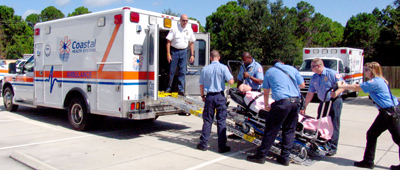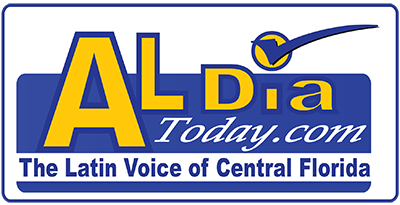
ROCKLEDGE – Para los 15.000 pacientes que dependen de ellos cada año, los paramédicos y técnicos de emergencias médicas EMTs de Coastal Health Systems son, literalmente, salvadores de vidas.
Debido a su ayuda, estos pacientes, muchos de los cuales tienen múltiples problemas médicos, pueden acceder a los servicios médicos como la diálisis, quimioterapia y radiación.
En la víspera de la celebración de 25 años en Brevard, Coastal sigue siendo único entre la mayoría de los sistemas de ambulancias en el país.
“Una gran cantidad de servicios de ambulancia son de propiedad privada, con fines de lucro”, dijo el presidente y CEO de Coastal, Bill McCarthy.”Algunos son franquicias o empresas que cotizan en bolsa.
“Coastal, por el contrario, es una organización 501 (c) (3) sin fines de lucro, estructurada como los tres hospitales que la crearon casi un cuarto de siglo atrás. El sistema se sirve de seis hospitales y 21 centros de enfermería especializada a lo largo de 72 millas de longitud de Brevard.
Los servicios son financiados por Medicare, Medicaid, seguros privados y pacientes particulares.
“Somos la única sede en la ciudad y respondemos por igual a cualquier llamado”, dijo McCarthy.
“We’re the only show in town and we respond equally to any call,” said McCarthy.
“We provide a lot of charity care.”
Unlike many areas, Brevard selected to have one ambulance system.
“Some counties have two or three ambulance systems and let the facilities determine who they want to work with,” said McCarthy.
The ambulance system began life in 1988 when Health First Cape Canaveral Hospital and Wuesthoff and Parrish Medical Centers partnered to establish a non-emergency, inter-facility ambulance that could free them from operating their own ambulance system.
Initially, Coastal served the central and northern areas of the county, while Harbor City Volunteer Ambulance Service covered southern Brevard. In 1998, Brevard County Fire-Rescue assumed emergency transportation and the county tasked Coastal with delivering non-emergency ambulance services throughout the entire county.
McCarthy, on board as CEO since 2000, has led the system into expanding its presence into Osceola and Indian River Counties. The system routinely transports patients to Orlando, Tampa and Jacksonville for specialized treatment.
A fleet of 20 ambulances and support vehicles deliver basic and advanced life support, as well as specialized transportation for patients with complex medical needs.
“At any given time, 14 of the vehicles are out in the field,” explained McCarthy.
A typical crew consists of paramedic and EMT. Basic life support, representing 64% of service calls, depends on the crew’s ability to assess patients’ condition and provide services such as airway management, oxygen delivery, application of bandages and administering CPR.
Approximately a fifth of calls require paramedics licensed in pre-hospital care to deliver advanced life support and severe medical emergencies. The system can also assist patients who need specialized services such as ventilators or balloon pumps. In some of these cases, the care is augmented by respiratory therapists or nurses.
“It is more much cost-effective and efficient to use Coastal than to tie up the taxpayer-funded 911 emergency services with non-emergency calls,” said McCarthy.
“We work together very well with Brevard County Fire-Rescue to ensure folks get the right type of transport.”
About a dozen of the ambulances are outfitted with specialized hydraulic stretchers to carry bariatric, or obese, patients. Obesity has been steadily increasing in the county, making the equipment essential for transporting sick patients.
“It used to be that some years ago, you’d see a 300-pound patient maybe once every few months,” said McCarthy.
“Now we see a 300-pound patient once a day, a 400-pound patient every week and a patient that weighs 500 pounds or more once a month. You need a minimum of four people to transport these patients. The equipment makes it safer for both the patient and the staff.”
The system has also purchased special ramps and winch systems for this patient sector.
“Coastal is the only company in Brevard County with this ramp and winch system to move bariatric patients. The specialty equipment we have allows to move these patients without jeopardizing their safety,” said Joe Goodwin, ambulance director at Coastal Ambulance.
To better respond to the needs of a diverse patient population, Coastal contracts with Language Live, a telephone-based interpreter service for more than 100 languages.
“Paramedics can hook patients immediately with the interpreter,” said McCarthy.
Because of the increasing risk of MRSA, Hepatitis C and other infectious viruses and bacteria, Coastal has added Zimek Biohazard and Decontamination Service to routine disinfection protocols already in place. Zimek is used to decontaminate each ambulance every month and each time an ambulance transports patients with bloodborne pathogens or communicable diseases.
“It smokes clean the interior of each ambulance, taking it to another level,” said McCarthy.
Coastal was accredited by the Commission on Accreditation of Ambulance Services in 2006 and reaccredited in 2009. It is only one of five ambulance services in Florida to receive this accreditation, the gold standard in the industry.
“We take great pride in everything we do to meet the needs of the community,” said McCarthy.
For more information on Coastal Health Systems, call  321-633-7050 or visit coaastalhealth.org.
321-633-7050 or visit coaastalhealth.org.
By Maria Sonnenberg
For Al Día Today

